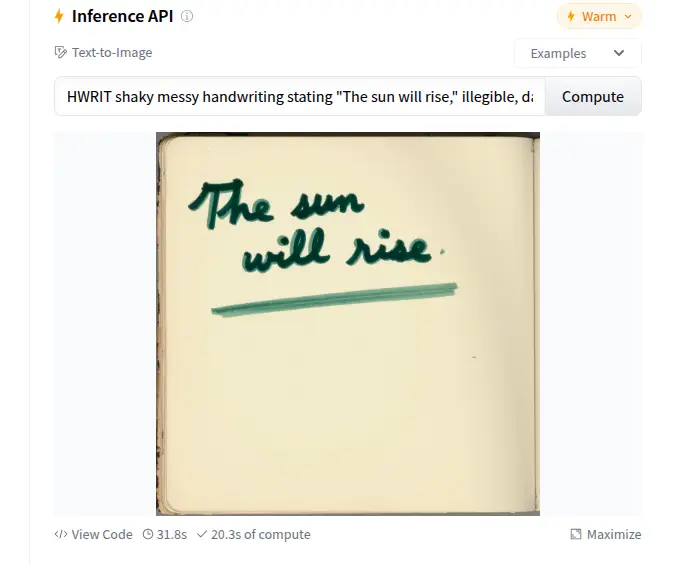Flux Handwriting Model: AI Mimicing Human Handwriting
This article explores the capabilities of Flux models, specifically the fofr/flux-handwriting model, for generating images of handwritten text. It details how to use this model via Hugging Face and its Inference API, showcasing its ability to create realistic-looking handwritten images from text prompts. The article then goes further, demonstrating the creation of a simple storytelling application that combines the fofr/flux-handwriting model with Google's Gemini LLM to generate a short story and then create a series of handwritten images illustrating its parts.
Flux Models and Handwriting Generation
Flux models are generative AI models capable of producing high-quality images and other media. The fofr/flux-handwriting model is a fine-tuned version specializing in generating images of handwritten text. The article explains how to access and use this model via two main methods:
-
Hugging Face: Direct access through the Hugging Face model page, utilizing the
diffuserslibrary or the Inference API. The article provides code examples demonstrating both approaches. Crucially, the prompt must include "HWRIT handwriting" to trigger the desired effect. -
Replicate: An alternative platform for running the model, although it incurs a cost per run.
Example Prompts and Outputs
The article includes examples of prompts and their corresponding outputs, highlighting the model's ability to interpret stylistic details such as handwriting style ("shaky," "messy"), ink color, and paper texture. Images are displayed to visually demonstrate the results.
Storytelling Application
The core innovation of this article is the creation of a storytelling application. This application leverages the Gemini LLM to generate a short story and then divides it into seven segments. Each segment is used as a prompt for the fofr/flux-handwriting model, generating seven handwritten images. These images are then combined using OpenCV to create a short video, effectively illustrating the story. The article provides the code for this application, including installation instructions and explanations of each step. Note that the code includes a delay to avoid exceeding API request limits.
Conclusion and FAQs
The article concludes by summarizing the potential of Flux models for creative applications and answers frequently asked questions about the fofr/flux-handwriting model, including its usage with the diffusers library and alternative access methods.




The provided images remain in their original .webp format. Note that the image paths are relative and would need to be adjusted depending on the actual file location.
The above is the detailed content of Flux Handwriting Model: AI Mimicing Human Handwriting. For more information, please follow other related articles on the PHP Chinese website!

Hot AI Tools

Undresser.AI Undress
AI-powered app for creating realistic nude photos

AI Clothes Remover
Online AI tool for removing clothes from photos.

Undress AI Tool
Undress images for free

Clothoff.io
AI clothes remover

Video Face Swap
Swap faces in any video effortlessly with our completely free AI face swap tool!

Hot Article

Hot Tools

Notepad++7.3.1
Easy-to-use and free code editor

SublimeText3 Chinese version
Chinese version, very easy to use

Zend Studio 13.0.1
Powerful PHP integrated development environment

Dreamweaver CS6
Visual web development tools

SublimeText3 Mac version
God-level code editing software (SublimeText3)

Hot Topics
 1663
1663
 14
14
 1420
1420
 52
52
 1315
1315
 25
25
 1266
1266
 29
29
 1239
1239
 24
24
 Getting Started With Meta Llama 3.2 - Analytics Vidhya
Apr 11, 2025 pm 12:04 PM
Getting Started With Meta Llama 3.2 - Analytics Vidhya
Apr 11, 2025 pm 12:04 PM
Meta's Llama 3.2: A Leap Forward in Multimodal and Mobile AI Meta recently unveiled Llama 3.2, a significant advancement in AI featuring powerful vision capabilities and lightweight text models optimized for mobile devices. Building on the success o
 10 Generative AI Coding Extensions in VS Code You Must Explore
Apr 13, 2025 am 01:14 AM
10 Generative AI Coding Extensions in VS Code You Must Explore
Apr 13, 2025 am 01:14 AM
Hey there, Coding ninja! What coding-related tasks do you have planned for the day? Before you dive further into this blog, I want you to think about all your coding-related woes—better list those down. Done? – Let’
 AV Bytes: Meta's Llama 3.2, Google's Gemini 1.5, and More
Apr 11, 2025 pm 12:01 PM
AV Bytes: Meta's Llama 3.2, Google's Gemini 1.5, and More
Apr 11, 2025 pm 12:01 PM
This week's AI landscape: A whirlwind of advancements, ethical considerations, and regulatory debates. Major players like OpenAI, Google, Meta, and Microsoft have unleashed a torrent of updates, from groundbreaking new models to crucial shifts in le
 Selling AI Strategy To Employees: Shopify CEO's Manifesto
Apr 10, 2025 am 11:19 AM
Selling AI Strategy To Employees: Shopify CEO's Manifesto
Apr 10, 2025 am 11:19 AM
Shopify CEO Tobi Lütke's recent memo boldly declares AI proficiency a fundamental expectation for every employee, marking a significant cultural shift within the company. This isn't a fleeting trend; it's a new operational paradigm integrated into p
 GPT-4o vs OpenAI o1: Is the New OpenAI Model Worth the Hype?
Apr 13, 2025 am 10:18 AM
GPT-4o vs OpenAI o1: Is the New OpenAI Model Worth the Hype?
Apr 13, 2025 am 10:18 AM
Introduction OpenAI has released its new model based on the much-anticipated “strawberry” architecture. This innovative model, known as o1, enhances reasoning capabilities, allowing it to think through problems mor
 A Comprehensive Guide to Vision Language Models (VLMs)
Apr 12, 2025 am 11:58 AM
A Comprehensive Guide to Vision Language Models (VLMs)
Apr 12, 2025 am 11:58 AM
Introduction Imagine walking through an art gallery, surrounded by vivid paintings and sculptures. Now, what if you could ask each piece a question and get a meaningful answer? You might ask, “What story are you telling?
 Newest Annual Compilation Of The Best Prompt Engineering Techniques
Apr 10, 2025 am 11:22 AM
Newest Annual Compilation Of The Best Prompt Engineering Techniques
Apr 10, 2025 am 11:22 AM
For those of you who might be new to my column, I broadly explore the latest advances in AI across the board, including topics such as embodied AI, AI reasoning, high-tech breakthroughs in AI, prompt engineering, training of AI, fielding of AI, AI re
 3 Methods to Run Llama 3.2 - Analytics Vidhya
Apr 11, 2025 am 11:56 AM
3 Methods to Run Llama 3.2 - Analytics Vidhya
Apr 11, 2025 am 11:56 AM
Meta's Llama 3.2: A Multimodal AI Powerhouse Meta's latest multimodal model, Llama 3.2, represents a significant advancement in AI, boasting enhanced language comprehension, improved accuracy, and superior text generation capabilities. Its ability t




